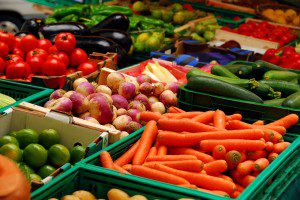

Myths, Misunderstandings & Miscommunications
The words “vegan,” “macrobiotic” and even “vegetarian” can sometimes carry a negative connotation such as diets lacking in real sustenance, deprived of nutrition and dispossessed of any real value. However, these fears are generated more from the concerns of a misled public and not from the decisions of well-educated individuals serious about health.
Continuously faced with questions like “But where do you get your protein from,” vegetarians and vegans alike can experience frustration. The dominating confusion surrounding protein and its function in our diet is extremely common, despite the fact that these amino acids can be found and eaten almost ubiquitously (most amply in lentils, beans and quinoa.) In fact, many researchers posit that too much protein is actually harmful for your body, a rarely discussed perspective in Western culture.
American society is slowly making strides toward understanding, accepting and accommodating plant-based diets, but there’s still a lot of hubbub around the vegan/macro grub. While many of us are informed and passionate about dietary nutrition, it never hurts to regroup and ground ourselves with up to date research. Simply following a plant-based diet does not necessarily mean that you are eating healthy. The challenges of finding nutrient-rich food options may lead us to rely more heavily on carbs or processed foods to sustain and fill us. Other times we may unknowingly eat foods which are normally healthy, yet were unfortunately grown, harvested or produced in an unwholesome manner. As Lily McCann pens in KwikMed.org’s article ‘Avoiding Common Vegetarian and Vegan Dietary Deficiencies’:
“In essence, all vitamins and minerals necessary for the human body to be healthy and vibrant can be found from natural, non-animal sources; however certain nutrients are more difficult to source due to the production methods of modern food.
The best way to avoid encountering dietary deficiencies when eating a vegetarian or vegan diet is to consume an abundant amount of fresh fruits, vegetables, grains, legumes, and nuts. Eating a balanced and varied diet consisting of foods which are naturally abundant in vitamins and minerals will give your body a high level of nutrition.”
The Dirt on Dietary Deficiencies
Are you absolutely positive you’re not nutritionally deficient? Thanks to KwikMed.org, here’s a brief rundown on commonly lacking, yet highly necessary nutrients in plant-based diets and all food regimens –
· Vitamin B12
Vitamin B12 is one of the most common deficiencies that can occur from eating a vegan or vegetarian diet. Vitamin B12 is naturally found in rich, non-depleted soil, and consequently it is absorbed into the food chain when animals eat the grass etc.
The best way to avoid a vitamin B12 deficiency is by taking whole food supplements that have been tested for safety and efficacy.
· Zinc
Zinc is a vital mineral for the immune system, neurological system, and skin. A Zinc deficiency is linked to numerous health conditions as the immune system is not able to function correctly and consequently cannot fight off infection as it should.
Zinc can be found in a whole host of natural plant based foods, and adapting your diet to include many more of these foods will certainly assist in raising zinc levels. Nuts, whole grains, sesame seeds, pumpkin seeds, lentils, swiss chard, beans, tahini and tofu all contain high amounts of zinc.
· Omega 3 Fatty Acids
There is often a large amount of confusion surrounding omega 3 fatty acids. In fact, a considerable number of people, vegetarian or not, are deficient in these vital nutrients. Omega 3 fatty acids play a key role in the nervous system, fighting infection and inflammation. They also help to lower blood pressure, treat depression, and prevent heart disease.
Flax seeds are considered to be one of the best sources of omega 3 in a vegetarian diet, containing many other fantastic health benefits as well. Walnuts are another great source of omega 3 fatty acids that can be added into your diet to keep omega 3’s at a healthy level.
· Iron
Iron is essential for a healthy body as it is an integral part of hemoglobin, which helps transport oxygen around the body. Vegetarians and vegans need to be especially careful to ensure that they are consuming an iron rich diet. As well as monitoring iron intake, it is important to ensure that you are getting enough vitamin C in the diet, as this aids the body to absorb and use iron effectively.
There are an abundance of plant-based sources of iron, including lentils, tofu, potatoes, beans, spinach, kale, quinoa, green beans, oats and many other plant-based sources.
· Calcium
There are an abundance of excellent plant-based sources of calcium available, though many people are simply not eating enough of them on a regular basis to ensure an adequate calcium intake.
Some of the calcium rich plant-based food sources include soybeans, broccoli, bok choy, grains, rice milk, tahini, beans, almonds, okra, mustard greens, and tempeh to name just a few.
For just $5.oo,, you can own a guide to starting your child on the healthiest path possible. This guide includes Infant and toddler recipes based on the world-famous Mediterranean Diet. It includes over 30 recipes and all the information you need to help your child live the healthiest life.